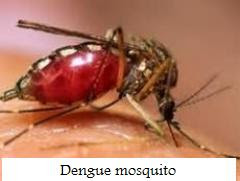Dengue fever also known as breakbone fever, is an infectious tropical disease caused by the dengue virus. Symptoms include fever, headache, muscle and joint pains, and a characteristic morbilliform skin rash. Treatment of acute dengue is supportive, using either oral or intravenous rehydration for mild or moderate disease, and intravenous fluids and blood transfusion for more severe cases. The incidence of dengue fever has increased dramatically since the 1960s, with around 50–100 million people infected yearly. Dengue is currently endemic in more than 110 countries. Others have more severe illness (5%), and in a small proportion it is life-threatening. The incubation period (time between exposure and onset of symptoms) ranges from 3–14 days, but most often it is 4–7 days. Therefore, travelers returning from endemic areas are unlikely to have dengue if fever or other symptoms start more than 14 days after arriving home. They bite primarily during the day. Other mosquito species—Aedes albopictus, A. polynesiensis and several A. scutellaris—may also transmit the disease. Humans are the primary host of the virus, but it may also circulate in nonhuman primates. An infection may be acquired via a single bite. A mosquito that takes a blood meal from a person infected with dengue fever becomes itself infected with the virus in the cells lining its gut. About 8–10 days later, the virus spreads to other tissues including the mosquito's salivary glands and is subsequently released into its saliva. The virus seems to have no detrimental effect on the mosquito, which remains infected for life. The dendritic cell moves to the nearest lymph node. Meanwhile, the virus genome is replicated in membrane-bound vesicles on the cell's endoplasmic reticulum, where the cell's protein synthesis apparatus produces new viral proteins, and the viral RNA is copied. Immature virus particles are transported to the Golgi apparatus, the part of the cell where the some of the proteins receive necessary sugar chains (glycoproteins). The now mature new viruses bud on the surface of the infected cell and are released by exocytosis. They are then able enter other white blood cells (such as monocytes and macrophages).
The initial reaction of infected cells is to produce the interferon, a cytokine that raises a number of defenses against viral infection through the innate immune system by augmenting the production of a large group of proteins (mediated by the JAK-STAT pathway). Some serotypes of dengue virus appear to have mechanisms to slow down this process.










"We've gotten pretty good about sun screen, but people need to get better about protecting themselves against insects as well, since mosquitoes are more than just a nuisance. They carry disease." To know how to prevent mosquito bites, Visit Mosquito net Chennai
ReplyDeleteNice info for travellers. Prevention from mosquitoes bites is very important. We need to follow guideline for mosquitoes spread diseases.
ReplyDeleteHelpful post with important points regarding health issues caused by mosquitoes. Malaria, dengue, chikunguinea, etc. can be avoided if you can keep your place clean and install mosquito nets. We are mosquito net chennai dealers and insist on this solution as it is better than harmful repellents.
ReplyDelete